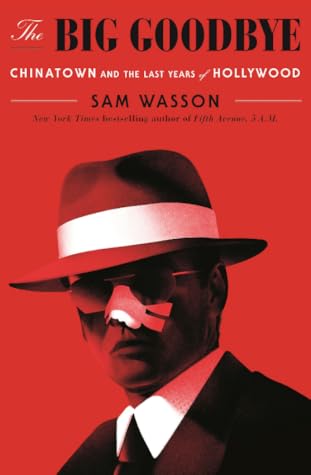More on this book
Community
Kindle Notes & Highlights
by
Sam Wasson
Read between
June 25 - June 30, 2021
Robert Towne once said that Chinatown is a state of mind. Not just a place on the map of Los Angeles, but a condition of total awareness almost indistinguishable from blindness. Dreaming you’re in paradise and waking up in the dark—that’s Chinatown. Thinking you’ve got it figured out and realizing you’re dead—that’s Chinatown.
“When a crime can no longer contain or content itself with the past,” Towne said, “and insists on visiting the future it’s no longer a crime—it becomes a sin, and very difficult to punish.” A crime that happened, that is happening, right in front of our eyes.
“Memories swell [like a bee sting],” he wrote. “When we first feel them in our skin there’s that breathcatching moment before knowing whether we’ll feel grief or joy.”
“I have no regrets,” he would write, “about having missed that semi-fabled epoch when men were men, women women, and writers rogues, but I increasingly feel—I suspect we all do—that the history of life on earth is not one of evolution so much as devolution. With each succeeding generation we get weaker and smaller; the Titans are always in the past.”
He read Ask the Dust by John Fante—an L.A. novel he had never heard of—which his assistant got from the public library downtown—and finally found what he was looking for: “I just knew that was the way those kids talked to each other—the rhythms, cadences, racism.” Ask the Dust, John Fante’s hymn to the vanished Bunker Hill and the dreams of rookie writers, put the city in his ear. He said, “If there’s a better piece of fiction written about L.A., I don’t know about it.”
“The wealthy will get wealthier and the young will die.”
Corruption was hardly a new concept; it was only that America, dreaming for centuries, Polanski believed, was late to the dark awakening. “You find these things in any country,” he said, “where money and power matter,” where good intentions, as Towne might put it, invariably surrender to futility. To powerlessness and defeat. Polanski was making Chinatown about the price of learning that particular truth, “whether about politics or the relationship between a man and a woman,” or the moment when the wall went up around the ghetto, and the phone rang in London and he learned, for all he thought
...more
Chinatown is a condition. The condition is the terrible awareness of one’s helplessness, what Towne had always called “the futility of good intentions.”
“The American has not yet assimilated psychologically the disappearance of his own geographical frontier,” wrote the philosopher William Barrett in 1962. “His spiritual horizon is still the limitless play of human possibilities, and as yet he has not lived through the crucial experience of human finitude.” A decade after this writing, that spiritual horizon reached its finitude in Vietnam and Watergate, and symbolically in Los Angeles, the geographic end of America.
“Perhaps no work of art is possible without belief in the audience,” Kael wrote, “the kind of belief that has nothing to do with facts and figures about what people actually buy or enjoy but comes out of the individual artist’s absolute conviction that only the best he can do is fit to be offered to others.… An artist’s sense of honor is founded on the honor due others. Honor in the arts—and in show business, too—is giving of one’s utmost, even if the audience does not appear to know the difference, even if the audience shows every sign of preferring something easy, cheap, and synthetic. The
...more
“What we learned in the sixties,” Thom Mount said, “is that trying to build an alternative structure outside the system, given the power of the system, is never going to work.”
Something—a faith—had been lost. Christopher Lasch, in his 1979 The Culture of Narcissism: American Life in an Age of Diminishing Expectations, observed: “Since the ‘society’ has no future, it makes sense to live only for the moment … to become connoisseurs of our own decadence, to cultivate ‘transcendental self-attention,’” to become, in short, narcissists, who, bereft of faith, live by a survivalist mentality, “expressed in its crudest form in disaster movies,” seeking escape in fame, sex, power, drugs—any delusion to resist the growing awareness of failure and futility. Drugs, addictions to
...more


